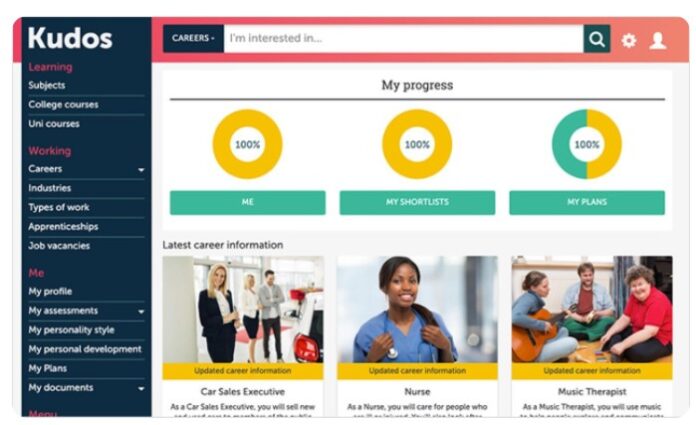Success looks different for everyone. Individual’s unique skills, interests, and needs all contribute to shaping their life beyond school. This is why personalised learning and personalised guidance related to careers education is so important to shaping young people today.
In the first installment of this series of articles, we discussed Why technology is the answer to preparing young people for the future. In today’s article, we tackle the vital role that planning plays in future success and the value of teaching students that there isn’t a one-path-fits-all approach to having a successful future.
Connecting core curriculum to future careers
Engaging students in a meaningful way is always something an educator worries about, especially when in the midst of some of the difficult maths and science subjects. It’s inevitable in the more challenging subjects that students will ask the age-old questions: “Why do I need to know this? Where am I ever going to use this in the real world?”
This is where a careers education and future-readiness program can come in handy, not just in engaging students, but also in grounding them and their experiences of difficult lessons.
Gatsby Benchmark 4, linking curriculum to careers, encourages schools and colleges to weave future-readiness throughout their curriculum. By requiring students to look at different careers related to the core curriculum, they will likely learn about ones they have never even heard of before. This may encourage students to refine their career goals and find new interest areas. And, by taking this approach, students may become more engaged while en route to discovering their dream job.
With Xello in their teaching toolkit, educators of all subjects can work alongside their school’s careers adviser to highlight connections between everyday lessons and real-world careers, while allowing students to investigate career profiles more deeply. Take the Bolsover School, who adopted Xello as their careers education and future-readiness tool and saw a 19% increase in student engagement within the first two weeks of implementation.
The difference between ideas and setting real goals
Thinking about the future is a key part of creating more meaning in our lives, or at least Summer Allen says so in her article How Thinking About the Future Makes Life More Meaningful. But, the role of thinking about or fantasising about the future and your goals can have different outcomes on realising them.
Research has shown that positively fantasising about successfully reaching a goal results in people putting in less effort towards realising it. But, when it comes to students thinking about their ideal future careers, a lot of good can come from the fantasy bit.
Drawing contrast between the fantasy and the reality of what it takes to get there reveals the work that is required and the barriers that must be overcome. For students, it’s one thing to fantasise about becoming a movie director and another to research or reverse engineer that goal to create a plan for how to get there.
With any of the career profiles found in Xello, for instance, students can see the levels of post-secondary education typically required for their dream career. They can then plan their pathway accordingly.
The neuroscience behind writing down goals and plans
As Mark Murphy points out in his Forbes article around the importance of writing down your goals, neuroscience plays a significant role in whether you’re successful at writing down your goals. He points out that the “generation effect”, a term coined by neuropsychologists, helps individuals better remember material they have generated themselves rather than material they’ve merely read.
Murphy points out that by writing down a goal “you get to access the ‘generation effect’ twice: first, when you generate the goal (create a picture in your mind), and second, when you write it down because you’re essentially reprocessing or regenerating that image… There’s a lot of cognitive processing taking place right there. In essence, you get a double whammy that really sears the goal into your brain.”
Research and planning reveals alternative pathways
When students think about what they will endeavour to do beyond secondary school, the answer doesn’t have to be limited to one course. Some students might have more experience, through family members or other key associations, with a particular pathway, such as university or the direct to work route. Students should be encouraged to reflect on their unique skills and interests, and level that self-knowledge to investigate the best post-secondary path for them.
The truth is that a Google search isn’t enough to equip students with a full understanding of their options. Students need the tools to connect the dots between what they want to pursue and the educational and/or on-the-job training that will get them there. Xello is a solution that promotes all pathways equally and even includes unique profiles covering the new T-levels introduced by the government.
Ready to learn more from education industry experts?
If you’re interested in learning more about how you can prepare young people for the future, check out the on-demand webinar ‘Are your students future ready?’, featuring a panel of education industry experts.
Credit: Source link









